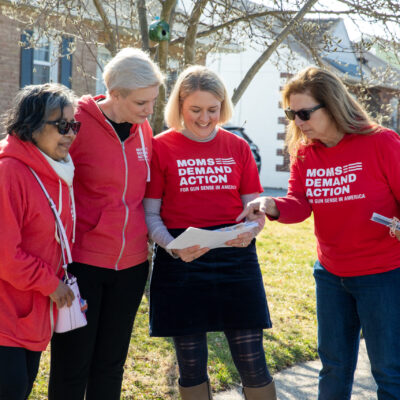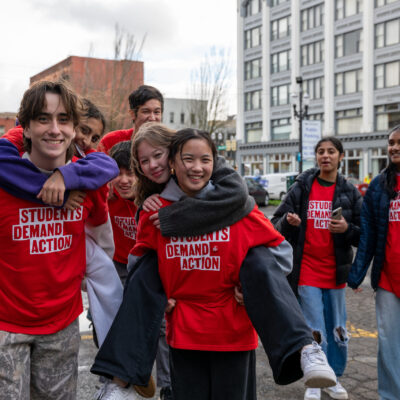Prohibit Guns in Sensitive Areas
What does it solve?
All fifty states and the District of Columbia allow civilians to carry concealed guns in public places. Laws differ in each state, but certain sensitive areas are always unsafe for guns.
In addition to keeping guns out of schools and off of college campuses, all states should prohibit civilians from carrying guns in sensitive places. This should include daycare centers, playgrounds and other places where children gather, bars and restaurants that serve alcohol, public demonstrations and rallies, airports, and courthouses. No location should ever be required by the government to allow guns. Unfortunately, many states’ laws fail to prohibit guns in sensitive areas.
Guns in K-12 Schools
Which states don’t allow teachers or the general public to carry guns in K–12 schools?
Alabama has adopted this policy
Alaska has adopted this policy
Arizona has adopted this policy
Arkansas has adopted this policy
California has adopted this policy
Colorado has adopted this policy
Connecticut has adopted this policy
Delaware has adopted this policy
Florida has not adopted this policy
- If not, who is allowed to carry under state law?
- School personnel
Georgia has not adopted this policy
- If not, who is allowed to carry under state law?
- School personnel
Hawaii has adopted this policy
Idaho has not adopted this policy
- If not, who is allowed to carry under state law?
- School employees with permission
Illinois has adopted this policy
Indiana has adopted this policy
Iowa has not adopted this policy
- If not, who is allowed to carry under state law?
- School employees
Kansas has not adopted this policy
- If not, who is allowed to carry under state law?
- School personnel and any other permit holders
Kentucky has adopted this policy
Louisiana has adopted this policy
Maine has adopted this policy
Maryland has adopted this policy
Massachusetts has adopted this policy
Michigan has adopted this policy
Minnesota has adopted this policy
Mississippi has not adopted this policy
- If not, who is allowed to carry under state law?
- Any permit holders; School personnel
Missouri has not adopted this policy
- If not, who is allowed to carry under state law?
- School personnel
Montana has adopted this policy
Nebraska has adopted this policy
Nevada has adopted this policy
New Hampshire has not adopted this policy
- If not, who is allowed to carry under state law?
- Any permit holders
New Jersey has adopted this policy
New Mexico has adopted this policy
New York has adopted this policy
North Carolina has adopted this policy
North Dakota has not adopted this policy
- If not, who is allowed to carry under state law?
- School personnel
Ohio has not adopted this policy
- If not, who is allowed to carry under state law?
- Individuals with written authorization of the board of education or governing body, including teachers
Oklahoma has not adopted this policy
- If not, who is allowed to carry under state law?
- School personnel
Oregon has not adopted this policy
- If not, who is allowed to carry under state law?
- Any permit holders
Pennsylvania has adopted this policy
Rhode Island has adopted this policy
South Carolina has adopted this policy
South Dakota has not adopted this policy
- If not, who is allowed to carry under state law?
- School personnel
Tennessee has not adopted this policy
- If not, who is allowed to carry under state law?
- School personnel
Texas has not adopted this policy
- If not, who is allowed to carry under state law?
- School personnel
Utah has not adopted this policy
- If not, who is allowed to carry under state law?
- Any permit holders; teachers
Vermont has adopted this policy
Virginia has adopted this policy
Washington has adopted this policy
West Virginia has adopted this policy
Wisconsin has adopted this policy
Wyoming has not adopted this policy
- If not, who is allowed to carry under state law?
- School personnel; Any permit holders
Myth & Fact
Myth
Mass shooters target “gun-free zones.”
Fact
While mass shootings in public places tend to receive more media attention, the majority of these shootings actually occur in private homes. When Mother Jones looked at every mass shooting that did occur in a public place over a 30-year span, they were unable to find evidence that a single mass shooter chose to target a place because it prohibited guns. Rather, studies have shown that most mass shooters were connected to the location, or were motivated by hate, a perceived grievance, or an interpersonal conflict.
How it works
Sensitive area prohibitions keep people safe where the risk of gun violence is elevated.
Certain sensitive areas are always unsafe for guns.
Daycare centers, playgrounds, and other places where children gather: Guns have no place here because of the danger of child access to firearms and unintentional shootings.
Bars and restaurants that serve alcohol: Drinking alcohol is associated with increased aggression and impaired judgment, elevating the risk of gun violence.
Public demonstrations and rallies, airports, and courthouses: These locations are targets for politically-motivated violence.
Laws prohibiting guns in or at these sensitive areas help protect public safety, while allowing guns in these sensitive areas undermines it. Many states’ laws fail to prohibit guns in these sensitive areas. Some states even require certain locations to allow civilians to carry guns. All states should protect public safety by ensuring that sensitive area restrictions are in place and routinely enforced.





